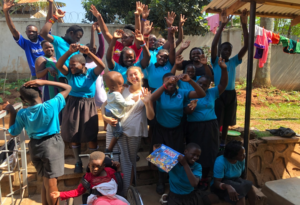CBL Interns, Gabi and Kathryn take to the blog to reflect on their experiences helping to lead the 2020 Non-Profit Careers Conference.
Gabi
Simply put, the Non-Profit Careers Conference was the perfect opportunity for students to learn about the non-profit sector and explore potential career paths. This informative experience brought the non-profit sector to life and enabled students to more deeply understand all of the aspects that make up a non-profit organization, from grant proposals and fundraising to how a business is actually run. For me, the most meaningful part of the conference was the opportunity to work with a non-profit organization from the Worcester community. Students were partnered with various organizations that provided case studies for us to work on and solve throughout the week. I found this portion of the conference to be particularly special because we were able to see the problems that real non-profit organizations struggle with each day and the creative resources they utilize to tackle these issues. Through this experience, I was able to gain hands-on experience with a non-profit organization and get a taste of what this type of work is all about.
In addition, embedded within the Non-Profit Careers Conference were various reflection sessions of which I found the one on discernment and vocation to be worthwhile. During this short session, I was able to reflect on myself and what I want out of life. I was reminded of the importance of discovering who I am before I decide what I will do with the rest of my life. People my age, and especially Holy Cross students, often feel pressured to find a career path and follow a strict order of steps to get there. We can get so caught up in the “I have to take these courses, have this GPA, be involved in these clubs, and work in this research lab if I want to get into medical school and become a doctor,” that we forget to slow down and enjoy our short amount of time as college students. The reflection session on discernment and vocation reminded me that it’s okay to take the time we need and learn about who we are. Our college careers do not need to follow a linear path, and in fact, it is on the non-linear path that we may learn more about who we are and what we really want to do.
Overall, the Non-Profit Careers Conference was incredibly beneficial in more ways than I ever could have imagined, as it allowed me to learn more about potential career paths, but also about myself and the kind of person I want to be.
Kathryn
This winter break, I had the opportunity to attend the Non-Profit Careers Conference. The other CBL Interns, Gabi Beaulieu and Dora Calva, and I had the unique perspective of helping the NPCC planning team and also attending the conference in its entirety. I saw the behind the scenes work of conference planning, which gave me a new appreciation for all of the work that people do to ensure smooth operations. Prior to the NPCC, I felt as though I had a general idea of the non-profit sector, but I was eager to learn more about the structures, missions, and foundations of non-profit organizations. At the conference, we heard from various speakers about the paths that led them to their jobs, such as how they became involved with their organization and why they chose their specific careers. I appreciated alumni sharing the steps they took after Holy Cross and the ways in which their time at Holy Cross influenced their involvement with non-profits. I learned about jobs I had not previously known existed, which gave me a greater understanding of the opportunities possible in the non-profit sector. I greatly appreciated the presentations on useful life skills: public speaking, grant writing, and leadership workshops.
Each participant at the NPCC also worked on a case study. I was on the team for the National Museum of Mental Health Project (NMMHP). The project uses exhibits in popular public places to prompt conversations about mental health, normalize these discussions, and erase the stigma surrounding mental illnesses. We visited two exhibits at Logan Airport in Boston, MA. The “Deconstructing the Stigma” exhibit shared over twenty people’s stories with mental illness. The narratives emphasized the need to talk about mental illness in everyday life and its prominence within our society. The “Yellow Tulip Project” exhibit consisted of photos of different people with “I am…” statements, showing that people with mental illnesses are more than simply a diagnosis. Seeing the exhibits in person was such a special experience because we were able to see the project’s mission in action. Our task for the case study was to research local non-profit organizations and write a grant proposal for more funding for the NMMHP. We prioritized funding for a new website and social media representation to make the project more well-known. On the final day of the conference, we shared our proposal and presentation and were able to talk to the founder of the project.
The NPCC was such a valuable experience, and I definitely learned skills that I will utilize in the future. On a personal level, I developed my team-building skills, strengthened my public speaking, learned how to network, and was exposed to new resources both on and off campus. On a broader level, I increased my knowledge on the types of jobs available in the non-profit sector and learned about various non-profit organizations. I am so thankful for this experience!


